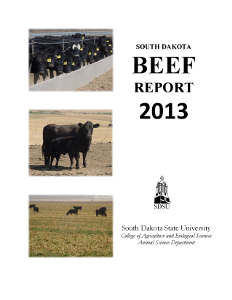Document Type
Report
Report Number
2013-1
Publication Date
2013
Summary
Research has suggested that maternal under‐nutrition may cause the development of a thrifty phenotype in the offspring, potentially resulting in greater adiposity and reduced muscle mass. These alterations in fat and muscle development could have lasting impacts on offspring growth, carcass characteristics, and meat quality. Thus, the objective of this study was to determine the influence of maternal energy status during mid‐gestation on offspring carcass characteristics and meat quality. To alter maternal energy status, cows either grazed pasture or were fed in a dry‐lot at 80% of the energy requirements for body weight maintenance during a mean period of 109 to 207 d of gestation. Changes in body condition score (BCS), body weight, ribeye area (REA), and 12th rib backfat were measured throughout mid‐gestation and were used to determine cow energy status [Positive (PES) or Negative (NES)]. Cows in the NES group had a significantly greater reduction in BCS, body weight, REA, and 12th rib backfat during mid‐gestation. Maternal energy status had no influence on offspring hot carcass weight, dressing percent, REA, percent kidney, pelvic, and heart fat, marbling score, percent intramuscular fat, objective color, or Warner‐Bratzler shear force. A tendency was seen for NES calves to have improvements in 12th rib backfat and USDA Yield Grade. A greater MRatio and IRatio (calculations used to compare the ratio of marbling (MRatio) and percent intramuscular fat (IRatio) with 12th rib backfat) were discovered in calves from cows experiencing a negative energy status during midgestation. These results suggest that maternal energy status during mid‐gestation may impact fat deposition in intramuscular and subcutaneous fat depots without impacting muscle mass.
Number of Pages
8
Format
application/pdf
Language
en
Publisher
South Dakota State University
Rights
Copyright © 2013 South Dakota State University
Recommended Citation
Mohrhauser, D. A; Taylor, A.R.; Underwood, K.R.; Pritchard, R.H.; Wertz-Lutz, A.E.; and Weaver, A.D., "The Influence of Maternal Energy Status During Mid‐gestationon Beef Offspring Carcass Characteristics and Meat Quality" (2013). South Dakota Beef Report, 2013. 2.
https://openprairie.sdstate.edu/sd_beefreport_2013/2

